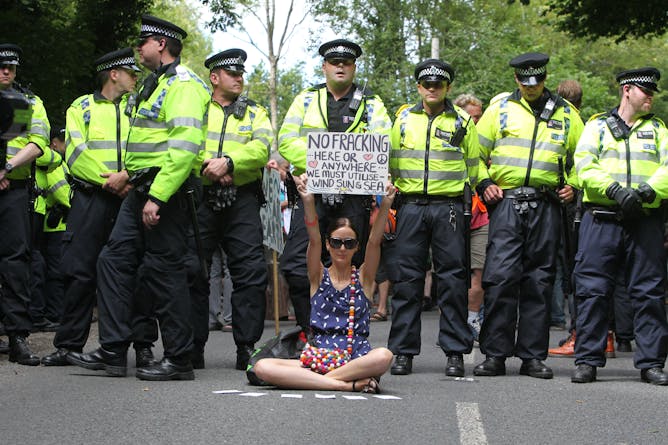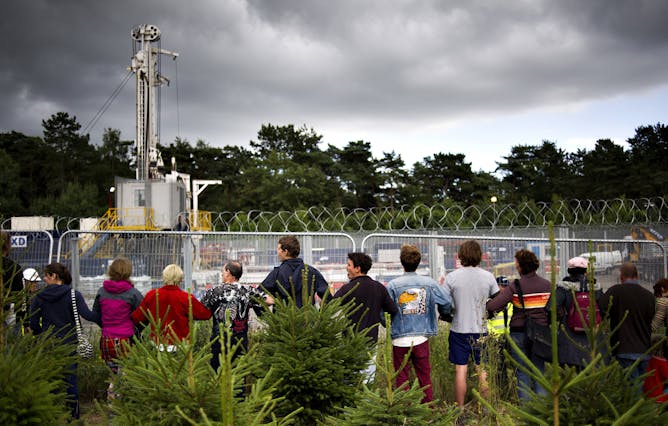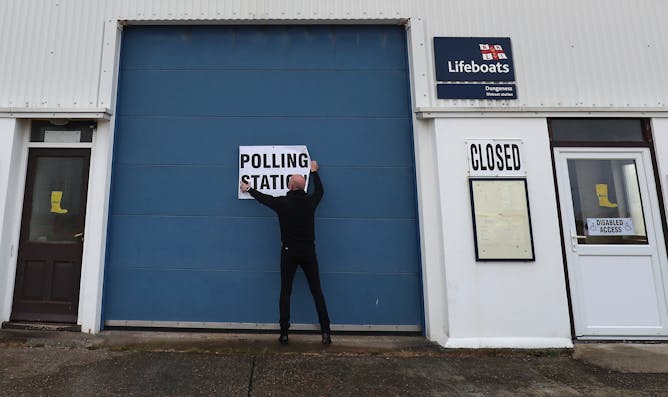|
|
|
Editor's note
|
|
When the government recently stopped all fracking in England, it was seen as a victory for the activists and NGOs who had long campaigned against it. Some had gone to great lengths. Over the past few years, protesters had blocked roads, locked themselves to equipment and used various other tactics to disrupt the controversial process. A group of academics spent three years talking to these fracking protesters, to see what motivated them and how the police responded. Will Jackson worries the police increasingly think only “non-disruptive” protest is actually legitimate.
But, hang on. What if fracking isn’t properly banned after all? Two academics may have discovered a loophole in the policy, as the moratorium only applies to fracking beyond a certain pressure. Fracking sites in the north of England exceed the limit, whereas gas exploration in the south should in fact be exempt from the ban. The latter sites are in safe Tory seats, whereas the northern fracking sites are often found in marginals. Is the
government playing politics with the fracking ban, wonder Keith Baker and Peter Styles?
Meanwhile, the electoral roll gets compiled each autumn which means hundreds of thousands of people could be in the wrong place when it’s time to vote in a December election. And an academic has looked at myths about only children – apparently an only child is likely to have just as many friends and be no more lonely than someone with lots of siblings.
|
Will de Freitas
Environment + Energy Editor
|

|
|
Top stories
|

Randi Sokoloff / Shutterstock
Will Jackson, Liverpool John Moores University
Protests that are merely disruptive are being policed as though they are dangerous.
|

Protesters form a human chain around a fracking site in Balcombe, West Sussex.
Bogdan Maran/EPA
Keith Baker, Glasgow Caledonian University; Peter Styles, Keele University
In Labour target constituencies in the North of England, the moratorium applies. But sites in safe Conservative areas in the South East will remain open for business.
|

Gareth Fuller/PA
Ron Johnston, University of Bristol; Charles Pattie, University of Sheffield
Many people move house every year – and few of them inform the electoral register.
|

YanLev/Shutterstock
Ana Aznar, University of Winchester
Only children are no more likely to be narcissistic than anyone else.
|
Politics + Society
|
-
Nick McKerrell, Glasgow Caledonian University
Broadcasters snubbing the likes of Nicola Sturgeon and Jo Swinson in favour of head-to-head debates with the two big party leaders just serves to stoke political tensions.
-
Sean Molloy, Newcastle University; Conall Mallory, Newcastle University
A new study examined what the UK priorities – and sidelines – at the UN Human Rights Council.
-
Sara Jones, University of Birmingham
The decision to move the Stasi files into the German national archive has sparked debate of how memories of life before reunification should be handled.
|
|
Science + Technology
|
-
Daniel Brown, Nottingham Trent University
Dark sky sites can inspire new generations of stargazers, but a better long-term solution would be connecting people with the night sky where they live.
-
Patricia Fara, University of Cambridge
The landscape artist bravely left her aristocratic life behind to help save lives on the Italian front.
-
Marco Pomati, Cardiff University; Shailen Nandy, Cardiff University
We found that current indicators underestimate nearly 6 million children suffering from malnutrition.
|
|
Business + Economy
|
-
Mark Shackleton, Lancaster University
The Saudi government's oil firm is set to become the world's biggest public company, but investors are already betting against its long-term prospects.
-
Gareth Dale, Brunel University London
The collapse of the East German economy following unification has combined with racism and neoliberalism to feed far right support.
|
|
Arts + Culture
|
-
John Wills, University of Kent
There are calls to boycott the latest release due to the game's questionable depiction of Russia.
|
|
Cities
|
-
Jonathan Rock Rokem, University of Kent
Berlin's rapid transformation is proof that cities can overcome conflict – but the fight against injustice doesn't end there.
|
|
Education
|
-
Markus Klein, University of Strathclyde ; Katherin Barg, University of Exeter; Michael Kühhirt, University of Cologne
When the wall fell – education equality did too.
|
|
| |
Featured events
|

|
The Berrill Theatre, Walton Hall, Milton Keynes , Milton Keynes, Buckinghamshire, MK7 6AA, United Kingdom of Great Britain and Northern Ireland — The Open University
|

|
Julian Study Centre Lecture Theatre, University of East Anglia, Norwich, Norfolk, NR4 7TJ, United Kingdom of Great Britain and Northern Ireland — University of East Anglia
|

|
Chancellors' Building 1.11, University of Bath, Claverton Down, Bath, Bath and North East Somerset, BA2 7AY, United Kingdom of Great Britain and Northern Ireland — University of Bath
|

|
Northampton Square, London, London, City of, EC1V 0HB, United Kingdom of Great Britain and Northern Ireland — City, University of London
|
|
|
|
| |
| |
| |
| |
| |
|
|
|
|
|
|
|